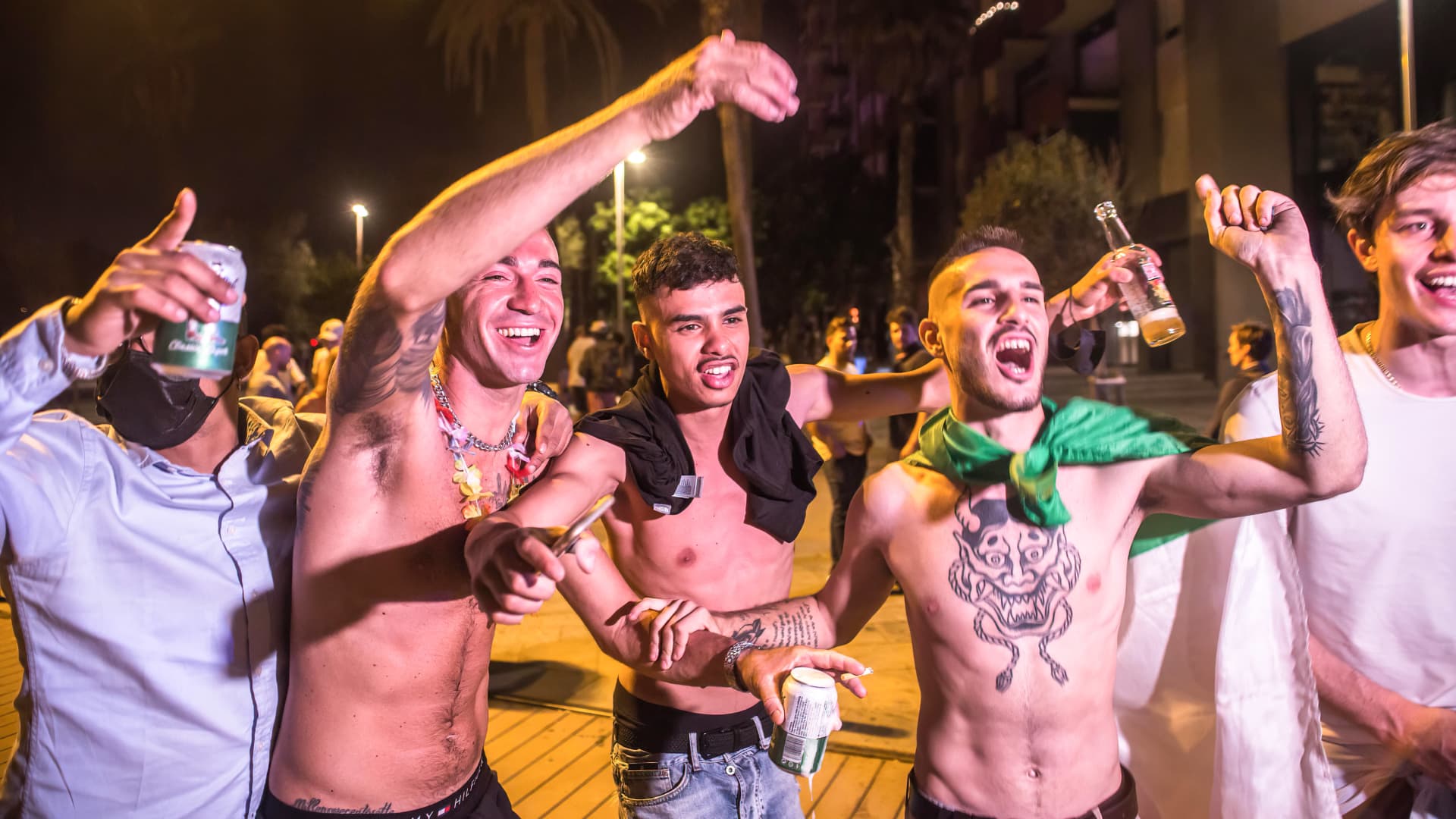
- Nightclubs and bars are fast becoming the new battleground in the fight against Covid-19.
- Covid is seeing a resurgence in Europe as the highly infectious delta variant spreads among the unvaccinated and partially-immunized population.
- Young people have been the last in line to receive a Covid vaccine.
LONDON — Nightclubs and bars are fast becoming the new battleground in the fight against Covid-19 as the nocturnal economy re-opens in some countries and coronavirus cases soar, particularly among the young.
Watch NBC6 free wherever you are
Covid is seeing a resurgence in Europe as the highly infectious delta variant spreads among the unvaccinated and partially-immunized population, which is predominantly young as they were the last in line to receive a vaccine.
At the same time, a number of European countries decided to revive their night time economies, allowing bars and clubs to reopen to the public again, some after 16 months of closure which put many out of business.
Get local news you need to know to start your day with NBC 6's News Headlines newsletter.
In England, nightclubs were allowed to reopen as the clock struck midnight on Sunday with thousands of revelers soaking up the lights, music and lack of face masks and social distancing. Experts are already warning that England's move is risky, particularly as other countries that reopened before it have now shut up shop (or club) again.
U-turns elsewhere
Other countries allowed their nightclubs to reopen in June, including the Netherlands and Spain, but both made rapid revisions and reversals given the Covid situation.
Money Report
In the Netherlands, nightclubs reopened on June 26 but the government soon regretted the decision, performing a U-turn just two weeks later, closing them down again on July 10 as Covid cases surged in the country, particularly among the young. More than 1,000 Covid infections were linked to one music festival in the Dutch city of Utrecht earlier in July.
Read more: Dutch try to stamp out rule-breaking in bars and cafes as Covid infections soar
On having to close its club doors until August 13, Melkweg, a venue in Amsterdam, described the move as "an annoying decision" but said that "due to the increasing number of infections, we believe that we cannot yet guarantee a safe environment for the public, employees and artists."
Lawrence Young, a virologist and professor of molecular oncology at Warwick Medical School at the U.K.'s University of Warwick, told CNBC on Wednesday that the country's experience was a warning to England.
"If you look at the data from the Netherlands, it's quite clear that it is that nightclub scene that has fueled this infection rate. It's clear that opening up, in the way that they did, particularly with the nighttime economy, has been a real driver to massive levels of infection. They saw an eightfold increase [in cases] in a week and most of that is in the 18-29 year olds," he noted.
"I don't want to appear to be a doomster but when you look at the pictures from England at the turn of midnight [when clubs reopened on Sunday] it is really frightening and for me it really is inevitable that we're going to have to reintroduce restrictions of some description" particularly, he said, while there were 18 to 30 year-olds not yet vaccinated or fully immunized.
The virus 'is not overcome'
Similar to the Netherlands, Spain was optimistic that it could also reopen nightclubs, a key component of its nocturnal economy and tourism sector.
In June, the government announced plans to allow all of Spain's 17 regions to reopen venues in time for the summer season. But with strict rules attached; clubs could stay open only until 3 a.m., there would be limits on the number of people allowed in venues (depending on the Covid situation in the region) and restrictions would stay in place until Spain reached a 70% vaccination rate.
A handful of regions opposed the move at the time but others went ahead, reopening their clubs around he weekend of June 26. Just like the Netherlands, however, cases soared among young people and several regions took the unilateral step to close venues again. Now, there is a myriad of varying rules on closing times, curfews and capacity across Spain, local media report.

On forcing clubs in Barcelona to close in early July — just a couple of weeks after they had reopened — Catalonia's regional government spokesperson Patricia Plaja noted that "we cannot pretend that we have overcome the virus. The data is worrying and the number of infections is growing at an exponential rate far beyond what we can afford."
Gustavo Ferrer, co-owner and director of the Macarena Club in Barcelona, which had to shut its doors earlier in July, told CNBC Thursday that having to close "has been very hard for us, we have been closed for many months."
The order to close was all the more frustrating, he said, because "we thought that the authorities had studied the situation well and had everything under control, but it was not like that and after two weeks we had to close again."
Read more: The beta Covid variant is causing concerns in Europe. Should we be worried?
Ferrer said the Macarena hopes to be open again in mid-August or early September with vaccine passports and antigen tests a way to get the industry back on its feet.
The British government announced at the start of the week that it was planning on making Covid vaccination compulsory for nightclub goers and other crowded venues in England from the end of September. This prompted criticism from the industry including from Michael Kill, CEO of the Night Time Industries Association, who commented on Twitter Tuesday: "So 'Freedom Day' for clubs lasted around 17 hours then."
Doctors are worried
Medical experts are duly worried about the infection rate among young people.
Chris Lutterodt, a doctor and spokesman for the charity Healthcare Workers Foundation, told CNBC that he the link between nightlife and Covid infections was obvious given it's "harder to maintain social distancing and enforce rules in this setting especially when alcohol comes into the mix."
"As a GP [general practitioner] I have seen a lot of mainly young people presenting after catching Covid for advice and support. This mirrors what we are seeing with an increased number of infections mainly affecting the younger people. I have seen patients who have attended hen and stag parties over the last few weekends where a significant proportion of them have developed Covid and, in one case, 6 out of the 8 attendees," he said.
Read more: Headache? Runny nose? These are among the new top 5 Covid symptoms, study says
"We need to remember that people who have recently been vaccinated with the first dose may not have sufficient immunity to protect them against catching Covid-19. It is important to follow government advice and social distancing measures where applicable to stop the spread."
Lutterodt said governments need to ensure that there are proper procedures in place before opening night time industries "if we are to avoid another spike in cases and re-closing of nightclubs which have really suffered throughout this pandemic."
As it is, however, he added that he was concerned a reopening of clubs will create "the perfect storm for an increase in cases and subsequent hospitalization especially over the autumn and winter months where we know the NHS (the National Health Service) is usually under tremendous pressure."






